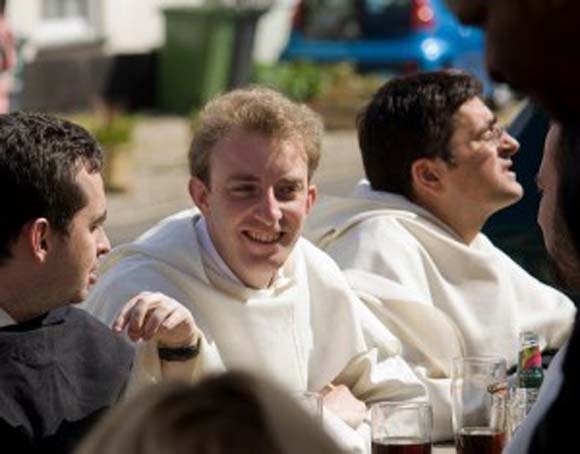
Quodlibet 23 – The Use of ‘Brother’ and the Study Programme
The use of the term brother for members of religious orders has its roots, as with most aspects of the religious life, in scripture. In the Old Testament there are numerous examples of the term which was often applied to any kinsman by blood, not just a son of the same parents, as in the case of Abraham, Lot and Jacob. For the Jewish people the term signified their common status as the people of God and Jewish law spelled out in detail the responsibilities of this brotherly relationship. For example in Deuteronomy 15:7 we read, “If among you, one of your brothers should become poor, in any of your towns within your land that the LORD your God is giving you, you shall not harden your heart or shut your hand against your poor brother.”
For the early Christians the term was much used and is firmly established in the scriptures of the New Testament. Indeed, throughout the New Testament the Greek word, philadelphia, is used to denote the love which Christians cherish for each other as brethren. “Having purified your souls by your obedience to the truth for a sincere love of the brethren, love one another earnestly from the heart” (1 Pet. 1:22) and in Hebrews 13:1 we read, “Let brotherly love continue.” The term koinonia, meaning fellowship or community, used to denote this body of early Christians, further reinforces this principle of brotherly love which should permeate the whole Church as the Body of Christ.
 It is then, clear to see where the roots of this term lay. In modern English the term friar, probably from the French frère, in turn takes its meaning from the Latin for brother, frater. The term ‘brother’ was then, a natural choice for ours and other religious orders, containing as it does, a rich scriptural heritage but also reminding us of our common vocation and of our equality before God and each other.
It is then, clear to see where the roots of this term lay. In modern English the term friar, probably from the French frère, in turn takes its meaning from the Latin for brother, frater. The term ‘brother’ was then, a natural choice for ours and other religious orders, containing as it does, a rich scriptural heritage but also reminding us of our common vocation and of our equality before God and each other.
The formation process for brothers, laid out in the Order’s Constitutions, reflects the goal of this brotherly unity. In the Rule of St. Augustine, on which our Constitutions are built, the first precept states, “Live together in unity and be of one mind and one heart in God, remembering this is the end for which you are gathered.” Though not all aspects of the formation of brothers are set in stone, the process in our Province can be broken down roughly as follows.
Beginning in Cambridge as postulants, there is a week’s retreat before being clothed in the habit of the Order. Here begins the Novitiate during which novices “experience the Order’s way of life, are trained mind and heart in the Dominican spirit, and their intention and suitability ascertained.” After at least one year but no more than two, a novice ordinarily makes simple profession for three years and begins in earnest upon our programme of philosophical and theological studies at Oxford. These academic studies are further supplemented by a variety of pastoral placements in term and out, as well as training in languages and preaching (as well as other skills such as IT, driving, cooking …). Simply professed brethren are normally admitted to the ministries of lector and acolyte and following three years can apply for solemn profession. If this request is accepted by the community, the brother then makes profession for life. It is normally following this that the brother, if on the clerical track, will apply for ordination first to the diaconate and then to the priesthood. If his superiors are “satisfied about his religious conduct, his suitability for priestly office and his progress in study” then the brother is ordained.
 There are, obviously, exceptions to this process depending upon individual circumstances, but this should give some idea as to the general formation process. It must also be remembered that priestly ordination does not mark an end to formation. Ongoing formation is taken seriously by the Order and has to do “with the brothers’ renewal and development in keeping with the different stages of their life’s journey, so that they are increasingly prepared to adapt their preaching of the Word of God to people today.” This, we hope, will equip us well to do the work of the Order which was established specifically “for preaching and the salvation of souls.”
There are, obviously, exceptions to this process depending upon individual circumstances, but this should give some idea as to the general formation process. It must also be remembered that priestly ordination does not mark an end to formation. Ongoing formation is taken seriously by the Order and has to do “with the brothers’ renewal and development in keeping with the different stages of their life’s journey, so that they are increasingly prepared to adapt their preaching of the Word of God to people today.” This, we hope, will equip us well to do the work of the Order which was established specifically “for preaching and the salvation of souls.”


